GivingHealthy
INSPIRING PHILANTHROPY IN THE COMMUNITY
MAX AND DEBRA ERNST: $8 MILLION OF GIVING TO BEAUMONT
CARDIOVASCULAR CARE


INSPIRING PHILANTHROPY IN THE COMMUNITY
MAX AND DEBRA ERNST: $8 MILLION OF GIVING TO BEAUMONT
CARDIOVASCULAR CARE

As we wrap up 2019 and begin 2020, I’m enjoying taking time to reflect on the past year. It’s certainly been one to celebrate here at Beaumont Health, and in this issue of Healthy Giving, you will read about some of its highlights.
Earlier this fall, we celebrated two exceptional philanthropic partners – Max and Debra Ernst – for their extraordinary gift to create a new heart center at Beaumont Hospital, Royal Oak. The Max and Debra Ernst Heart Center brings a number of services together into one convenient and easily accessible location and puts a special focus on the needs of patients with heart failure.
Across the health system, we are truly fortunate to be working alongside individuals, foundations and corporations who are investing in the work of our clinicians and researchers, seeking to enrich and expand care for the hundreds of thousands of patients we serve each year. A generous group of donors banded together to create the Michael E. Maddens, M.D. Distinguished Chair of Internal Medicine, honoring a long-time and much-loved physician and benefiting internal medicine and geriatric care. Other donors, like Janine and Kevin Rinke, are giving back for care they received, helping women gain better access to potentially life-saving advanced breast imaging technology.
Across the health system, we are truly fortunate to be working alongside individuals, foundations and corporations who are investing in the work of our clinicians and researchers, seeking to enrich and expand care for the hundreds of thousands of patients we serve each year.
Philanthropic support is also allowing us to implement two new and exciting programs that have the potential to impact thousands of lives. A grant from the Michigan Opioid Partnership is being used to create a multidisciplinary addiction medicine team that will focus on treating patients seen in the Emergency Center and in the inpatient setting who are diagnosed with opioid use disorder. Additionally, support from the Michigan Health Endowment Fund is allowing Beaumont Hospital, Taylor to partner with Wayne State University to implement an integrated medical/behavioral health team model in its Emergency Center, filling an important gap in mental health care.
As we close out this year, I am tremendously grateful for our extraordinary philanthropic partners — you truly are the reason our patients can count on Beaumont Health to provide the most leading-edge, exceptional care possible. On behalf of these patients and their families, and all the communities we serve, thank you for your compassionate support.
With warmest regards,
Margaret Cooney Casey Chief Development Officer, Beaumont Health President, Beaumont Health Foundation


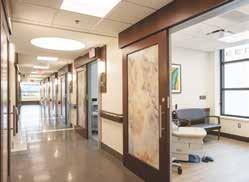


Beaumont Health has recently taken another exciting step forward in our growth as a regional, value-based health care organization.
As you might have heard, this summer, Beaumont and Akron, Ohio-based Summa Health signed a letter of intent to develop a strategic partnership. After receiving state and federal approvals next year, we expect the transaction to close by the end of the first quarter of 2020. At that time, Summa will become a subsidiary of Beaumont.

It is an exciting opportunity for many reasons — not the least of which is, this is the first time Beaumont will expand across our state border. Beaumont and Summa are already strong and successful health care leaders. By welcoming Summa into the Beaumont family, both organizations will share expertise, invest in each other and thrive as the industry evolves.
This partnership also aligns well with our six core strategies:
• Beaumont has been strategically focused on selective regional expansion since its formation in 2014. The combined strength of Summa and Beaumont would allow both organizations to continue to invest in local health care and expand programs and services.
• SummaCare, Summa’s insurance company, offers health plans and services to employers of all sizes as well as individuals and families, including Medicare-eligible individuals. Beaumont is expected to introduce a Medicare Advantage plan in Michigan next year in addition to other health plan options.
As we continue to evolve, I am very grateful for your dedication and support, which allows us to extend our compassionate reach even further.
• By working together from positions of strength, both organizations will maximize opportunities to deliver health care more efficiently and effectively.
• This partnership will provide Beaumont and Summa opportunities to grow and expand our clinical care network to better serve our patients.
• The agreement also builds on the commitment of both organizations to medical education and creates more opportunities for medical students to train and work.
• Finally, we will engage everyone to help us be the best place to work and practice medicine at every site and location within the organization.
We look forward to this partnership, which will support ongoing growth and expansion to serve patients better in Michigan and Ohio. As we continue to evolve, I am very grateful for your dedication and support, which allows us to extend our compassionate reach even further. Thank you for all you do for Beaumont Health.
With much gratitude,
John Fox Beaumont Health President and CEO

Passionate about investing in their local community, Mike and Miko Ceaser recently decided to make a gift in support of the expansion of Beaumont Hospital, Trenton’s Cardiac Rehabilitation Center. Their $50,000 commitment has helped transform the center, nearly doubling its size and relocating it to the main hospital building, making it more easily accessible for patients.
The new center now includes a room for initial consults and private conversations between patients and clinicians. There is now also a waiting area for family
members where they can participate in educational lectures and observe exercise sessions. To date, there has been a more than five percent increase in cardiac rehab visits.
Studies have shown that patients who take part in rehabilitation after a cardiac event can dramatically improve mortality rates, enhance quality of life, reduce hospitalizations and more. The Ceasers’ generous gift is making a significant difference in helping cardiac patients return to their daily lives more quickly and with greater confidence, helping them heal and thrive.


The Sheryl L. and David B. Cotton Family Birth Center at Beaumont Hospital, Grosse Pointe has always provided exceptional care. Now the goal is to do even more with the addition of a special care nursery. Thanks to the generosity of Meridian Health Plan of Michigan and their recent pledge of $100,000, the project is moving ever closer to fruition.
For mothers who may be concerned about a high-risk pregnancy, the presence of a special care nursery onsite at Beaumont, Grosse Pointe will be a comfort. These nurseries provide warm, state-of-the-art environments for infants who are born prematurely or who may have health issues but who do not require care in a neonatal intensive care unit.
When completed, the Special Care Nursery at Beaumont, Grosse Pointe will be located adjacent to the Cotton Family Birth Center and will offer leading-edge technology and highly trained specialists to watch over newborns and provide support for parents and family. Through the generosity of community partners like Meridian, Beaumont can better ensure all newborns have a strong healthy start in life.
Thanks to a recent $150,000 grant from the Flinn Foundation, teenagers living in medically underserved communities will soon be able to access mental health care through a new tele-counseling initiative.

Students at Annapolis High School in Dearborn Heights and Romulus Middle School in Romulus will have confidential access to off-site social workers who will be available to help them via online counseling sessions through a broad range of mental and behavioral health needs, helping improve accessibility, reduce stigma and stop problems before they start.
Approximately one in five children in the United States has a diagnosable mental, emotional, or behavioral disorder. For many young people, accessing mental health care can be challenging due to limitations such as transportation, insurance coverage, and a sense of shame. These challenges are especially significant for children and teens living in poverty. The Flinn Foundation grant will ensure that students can benefit from these valuable tele-counseling services at no cost to them or their families through their community Beaumont teen health centers.
After accomplished and rewarding careers with Beaumont, retired physicians Dr. Prem Khilanani and Dr. Urmilla Khilanani still had a vision for pediatric care in the Troy community. Family is everything for the Khilananis. Thinking about their own children, who are neonatal intensive care clinicians, and their beloved young grandchildren, they decided to make a $50,000 gift in support of the Neonatal Intensive Care Unit expansion project at Beaumont Hospital, Troy. The NICU provides premature and ill newborns with the specialized care and technology they need to gain strength, grow and join their families at home to start their new lives together. The Khilananis’ gift will be joined with others to make possible the construction of a new NICU in the hospital’s critical care tower to replace the current space which has become too small for the growing number of births taking place at Beaumont, Troy each year.

In September, the Max and Debra Ernst Heart Center opened its doors on the campus of Beaumont Hospital, Royal Oak. The new center is now the second one to bear the Ernst name at Royal Oak, following an extraordinary $5 million gift that brings their total support of cardiovascular care at Beaumont to $8 million.


The Ernsts were honored at a September 10 celebration that brought hundreds of guests together to see the new center and learn more about the difference it will make for cardiovascular patients, particularly the growing number of individuals in Southeast Michigan facing heart failure.
“When we began this project, we set out to create something truly special and to provide a remarkable patient experience,” said Simon Dixon, MBChB, chair of Royal Oak’s Department of Cardiovascular Medicine. “The new center is simply spectacular and will be a center of hope and healing for thousands of patients for years to come.”
The new 14,000-square-foot center, located adjacent to the hospital’s East Entrance, is dedicated to consolidating cardiac care into one convenient and comprehensive setting. It will help patients better manage their conditions through medication management, nutrition and regular monitoring visits. This type of ongoing care not only improves quality of life for patients, it also has been shown to reduce emergency center visits and hospital readmissions.
In addition to a congenital heart disease clinic, the center will be home to clinics for:
• atrial fibrillation
• cardiology genetic counseling
• non-invasive cardiovascular testing such as stress testing and echocardiograms
This past year, Beaumont, Royal Oak’s cardiovascular program was again ranked among the very best in the United States, according to U.S. News and World Report.
“This level of excellence is made possible in large part because of philanthropic partners like Max and Debra who allow us to invest in the advancement of patient care,” said Carolyn Wilson, Beaumont Health chief operating officer.

“Part of what inspired this center is seeing what heart disease can do to families and wanting to ease that burden,” said Max Ernst.
Said Debra Ernst, “This project has been very personal to me. I lost my dear mother Madelyn Gruskin this past April. There is no doubt in my mind that without the help of her wonderful Beaumont doctors she would not have lived to the age of 94. This new center would have been the place where my mother would have gone for all her heart needs rather than driving to different doctors throughout the city.”
As community leaders and philanthropists, Max and Debra Ernst are focused on giving back. Max Ernst’s life story is a near embodiment of the American dream. Born in Europe just before World War II, he was the youngest of three children. His mother risked everything to get Max and his siblings on the last ship to leave Nazi Germany for the United States. The family came to Detroit, where Max grew up and went into the drug store business in partnership with the late Eugene Applebaum. (continued on next page)
Max and Debra Ernst at the center’s media launch• Heart failure occurs when the muscles in the heart grow too weak to effectively pump blood.
• It is a serious and complex condition that can be managed with ongoing care and monitoring.
• Heart failure has become a national epidemic with nearly 6 million patients living with the condition in the United States.
• More than 900,000 new cases are diagnosed every year.
• It is forecast to remain the leading cause of hospitalization for both men and women ages 65 years and older.
• At Beaumont Health last year, more than 34,000 patients with a diagnosis of heart failure were treated.
The two men built Arbor Drugs into a highly successful enterprise that was eventually sold to CVS Corporation. Ernst also has had a highly successful career in commercial real estate as the owner of REM Management, which owns and manages millions of square feet of office, industrial and retail space.
In 2006, Max and Debra married and three years later, made a $3 million gift to create the Ernst Cardiovascular Center at Royal Oak, honoring the memory of Max’s late wife Ellen. The center quickly became known as one of the nation’s premier programs for structural heart disease and minimally invasive valve surgery as well as a world-recognized training program for physicians from around the world.
It also became the site of one of the community’s most effective cardiovascular screening programs, the Student Heart Check, supported by the Ernsts from day one.

The program has provided life-saving screenings for close

to 18,000 student athletes in southeastern Michigan as well as hands-only CPR and AED training for students. Since the program began, more than 200 students were found to possibly have a heart issue and told to stop athletics to see a cardiologist. And there have been nine confirmed cases of hypertrophic cardiomyopathy, the number one killer of young student athletes.
As Max said of the program, “If this can save even one life, it will have been worth it.”
That is a philosophy that continues to guide this couple. “They have dedicated themselves to improving the lives and heart health of countless members of our community and beyond,” said Margaret Cooney Casey, president of the Beaumont Health Foundation. “They have been extraordinary partners, helping our physicians transform their visions for patient care into reality.”
A dedicated group of donors and physicians have joined together to raise awareness and support for advanced breast imaging technology at Beaumont Health.

The Advanced Breast Imaging Campaign Committee includes breast cancer survivors, breast health advocates, clinicians and friends of Beaumont all working toward a total goal of $10 million to acquire state-of-the-art imaging equipment to spot breast cancer in its earliest and most treatable stages.
Generous gifts from numerous committee members as well as donors from throughout the community have put the campaign within $5 million of its overall goal.
Funds raised will help Beaumont secure a total of 34 digital breast tomosynthesis, or 3D mammogram, systems as well as seven whole breast ultrasound systems. Software to allow physicians and technicians to better evaluate readings also is part of the campaign.
The 3D mammogram systems produce improved images, which increase early detection rates and decrease call-back rates and false positive readings.
Whole breast ultrasound systems are an important screening option for women who are at high risk for breast cancer and cannot have an MRI as well as women who should not be exposed to radiation from mammogram (due to pregnancy or other concerns) and women who have very dense breast tissue.
“This committee is doing phenomenal work in advocating for this technology and for the importance of early detection and screening in breast cancer care,” said Murray Rebner, M.D., senior staff radiologist, Breast Imaging and Intervention, and physician advisor to the committee. “They are spreading the word, inspiring others to give, and are supporting our efforts with their own philanthropic investments. We are very grateful for their work, which we know will save and improve lives.”
The Advanced Breast Imaging Campaign Committee builds upon the dedication and support of long-time breast care advocates and donors who are seeking to do even more to further the effort.
Breast cancer is the second most commonly diagnosed cancer in women, with one in eight women affected by the disease. Because of the large number of women who receive screenings through Beaumont each year, our hospitals diagnose more breast cancers than any other health system in southeastern Michigan.
Ultimately, the addition of this technology will support the work of clinicians whose efforts have helped five-year survival rates for Beaumont breast
cancer patients exceed the national average.
“The Advanced Breast Imaging Campaign Committee, and those that lead its efforts, are truly special individuals,” said Donald Conn, M.D., Beaumont medical director for Imaging and physician advisor to the committee. “Some have experienced this disease themselves while others have supported family and friends through their own journeys. As a result, they are dedicating themselves to ensuring that the women in our community have access to the most advanced, state-of-the-art imaging equipment available. We are deeply grateful for all that they are doing.”


Dr.
Following his retirement in January, a number of his former patients and their families felt it was time to show their appreciation for Dr. Maddens and his exceptional career.
The John and Marilyn Bishop Charitable Foundation, the Fred A. and Barbara M. Erb Family Foundation, the June and Robert Gurwin Family Foundation, Lori and Steve Weisberg, Karen Glorio Luther, and Sally and Graham Orley all made generous gifts to create the Michael E. Maddens, M.D. Distinguished Chair of Internal Medicine.
of Internal Medicine, Dr. Maddens created a culture of excellence among his fellow clinicians while advancing the internal medicine program and creating innovative programs for the elderly.

He founded the Beaumont Geriatric Clinic, one of the first programs specifically designed for elder care, and invested significant time and effort in physician and nurse education to support geriatric patients.
In addition, he led efforts to create:
• The Alvin and Henrietta Weisberg Center for Acute Care of the Elderly at Royal Oak
• The William and Audrey Farber Family Geriatric Nursing Education Program
• The Marvin and Betty Danto Family Foundation
“Dr. Maddens spent his career focused on helping others, and through the creation of this position, his extraordinary legacy as a physician, researcher and educator will continue,” said Dr. Leslie Rocher, chief medical officer at Beaumont Hospital, Royal Oak.
Throughout his career and most recently, as chair of the Department
Comprehensive Geriatric Emergency Medicine Program
Dr. Maddens also led an active career in clinical research, helping pioneer several promising studies in Alzheimer’s disease. And he helped support the next generation of physicians as professor and chairman of the Department of Medicine at the Oakland University William Beaumont School of Medicine.
“The Fred A. and Barbara M. Erb Family Foundation was pleased to make this gift to help establish the
chair in Dr. Maddens’ honor in recognition of the compassionate care he provided my parents during their later years, as well as so many other elderly patients in our community,” said John Erb, chair and CEO of the foundation.
Other donors expressed that same gratitude for a physician whose compassion shone through his every action. “Dr. Maddens’ care and interest in his patients are what motivated us to support the Michael E. Maddens, M.D. Distinguished Chair of Internal Medicine,” said Sally and Graham Orley. “He is a very caring and helpful doctor. He was always on top of everything … he was just there for us. We hope that in retirement he will find wonderful challenges for his brilliant mind.”
An endowed chair provides an ongoing foundation through which new programs, initiatives and research projects can be developed and other existing programs can be expanded. This chair will support program development and research for both internal medicine and geriatrics. Its first holder will be Dr. Christopher Carpenter, the new chair of Internal Medicine at Beaumont Hospital, Royal Oak.
Michael Maddens spent more than 30 years supporting and caring for patients at Beaumont Hospital, Royal Oak and it is no exaggeration to say he impacted thousands of lives.
When a person with mental health issues is in crisis, there is no time to lose in finding care. Often, family members or friends will rush the person to their local emergency center, lacking any other options. While emergency centers can provide outstanding care for physical needs, they often do not have access to psychiatric services for their patients, due to a statewide shortage of mental health providers.
A recent $438,214 grant from the Michigan Health Endowment Fund is helping to address this urgent issue, allowing Beaumont Hospital, Taylor and Wayne State University (WSU) to partner on a model of care that uses telepsychiatry services to expedite diagnoses and treatment plans for mental health patients in the Emergency Center.
With this system, a social worker in the EC facilitates a real-time video consultation between patients, remote psychiatrists and other medical staff to develop a treatment plan.
Because of the shortage of psychiatrists in the region and in most hospitals, there can often be long waits in the EC for patient psychiatric evaluations. These waits can worsen a behavioral health crisis, leading to patient agitation or violence, and the need to restrain or seclude these patients. The telepsychiatry model will help dramatically reduce those wait times and allow emergency center staff to focus on the medical needs of the patient versus the behavioral.
“In 2018, more than 2,500 patients visited Beaumont, Taylor’s Emergency Center with a behavioral health condition,” said Lee Ann Odom, president of Beaumont, Taylor. “We are so grateful for this grant, which will have an impact on so many patients and their families and will improve the Emergency Center experience as a whole.”
The grant also will support the use of trained social workers in the EC to facilitate communication between all members engaged in the consultation and most importantly, reassure patients. It is also anticipated that these interventions will lower psychiatric acuity, lessening
violent incidents and use of restraints or seclusion. Expediting psychiatric care will also increase space for other patients in the EC and reduce the need for costly one-on-one supervision of patients who previously waited a long time for psychiatric consultations.

This grant also will support the addition of Compassionate Care Training classes for EC staff to help them understand more about psychiatric patients, their concerns, and common psychotropic medications and therapeutic techniques. This skills-based curriculum will help destigmatize mental illness and prevent and de-escalate behavioral health crises in the EC.
“This generous grant will allow us to fill an important gap,” said Beaumont Health Foundation President Margaret Cooney Casey. “We are deeply grateful for the opportunity to expand our services even further and reach our patients in new life-changing ways.”
The overuse of opioid drugs throughout the United States and the heartbreaking deaths that have occurred as a result constitute a growing national public health emergency.
In 2017, there were more than 2,000 opioid overdose deaths in Michigan alone — a record high. And only 20 percent of people with opioid use disorder (OUD) are receiving treatment for their addiction.
Thanks to a $995,000 grant from the Michigan Opioid Partnership, Beaumont Health is poised to change that. The grant, which was publicly announced at a press conference by Michigan Governor Gretchen Whitmer in June, is allowing Beaumont to create a multidisciplinary addiction medicine team, consisting of addiction physicians, nurse practitioners, social workers, peer recovery coaches and pharmacists. This team will identify patients, begin medication assisted treatment and connect patients to a peer recovery coach who will then assist with a referral to a community treatment organization.
“Addiction is not a moral failing; addiction is a disease,” Whitmer said at the press conference. “But we can combat addiction when we work together.”
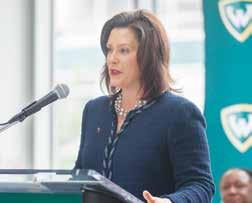

The program will initially be implemented at Beaumont Hospital, Royal Oak. Upon admission, every patient will be screened for OUD. If during this screening — or at any time during an inpatient stay — a patient is found to be at risk for OUD, the Addiction Medicine Team will be contacted. The team anticipates treating approximately 100 patients per month through this new program, including patients who previously would only have been treated for their presenting injury or illness, but not their underlying addiction.
“The funding provided by the Michigan Opioid Partnership will help Beaumont Health make a positive change in this public health crisis and fortify our community’s effort to battle the opioid epidemic,” said Dr. Rebecca Clemans, a pain management physician with Beaumont Health.
In addition to the Community Foundation of Southeast Michigan, which is home for the combined effort, the Michigan Opioid Partnership includes:
• The Michigan Department of Health and Human Services
• The Blue Cross Blue Shield Foundation
• Blue Cross Blue Shield
• The Michigan Health Endowment Fund
• The Superior Health Foundation
• The Ethel and James Flynn Foundation
• The Jewish Fund
The Addiction Medicine Team will initiate Medication Assisted Treatment and harm reduction therapy while patients are being treated at Beaumont, two methods that have proven effective for treating opioid addiction. Upon discharge, patients will be transitioned to treatment maintenance programs in the community, leading to healthier outcomes. The team also will increase education about addiction and promote safer opioid prescribing methods and harm-reduction efforts. If successful, Beaumont hopes to expand this program to additional sites throughout the health system.
“This grant truly has the power to change lives,” said Beaumont Health Foundation President Margaret Cooney Casey. “We are deeply grateful for the support of the Michigan Opioid Partnership as we address this important issue.”

Janine Rinke was relieved to hear her routine mammogram had come back clear, but a few months later she recognized a warning sign, returned to Beaumont and was diagnosed with breast cancer. Janine underwent treatment, and in time entered remission. After a positive experience as a patient in Beaumont’s breast care program, Janine and her husband Kevin Rinke wanted to give back and help bring advanced breast imaging to Beaumont Hospital, Troy.
Their generous gift will help the hospital acquire 3-D mammogram technology, also known as digital breast tomosynthesis (DBT).
“Kevin and I feel blessed for the opportunity to help advance the Beaumont breast imaging cause, which will truly benefit the community through early detection and improved outcomes,” said Janine.
When used in conjunction with 2D mammography (and in contrast to using 2D mammography alone) studies have shown that digital breast tomosynthesis:
• Increases invasive breast cancer detection rate by 25 percent
• Decreases rate of call backs by 38 percent
• Decreases false positive readings by 15 percent
Advanced breast imaging can even detect strains of breast cancer that can sometimes evade traditional mammography, like lobular breast cancer which grows in strands instead of masses. While all patients benefit from advanced breast imaging, this technology is especially helpful for women who have dense breast tissue, are at high risk for breast cancer, who have already had breast cancer or women who have atypical breast tissue like benign masses.
Data shows that if physicians are able to find breast cancer at an early point in its development, either stage 0 or stage 1, then the survival rate stands at approximately 95 percent.
Advanced breast imaging also improves the patient experience. This technology causes less discomfort during the screening process, potentially making the prospect of annual breast screening less intimidating for some patients. Additionally, the increased accuracy also reduces the need for further evaluation and testing, leading to less disruption and anxiety for patients.
“It’s deeply gratifying to see people who have been on this journey come back to support care at Beaumont,” said Dr. Murray Rebner, senior staff radiologist, Breast Imaging and Intervention. “The Rinkes’ generosity is going to make a significant difference in allowing us to bring tomosynthesis technology to more and more women in the communities we serve. I’m very grateful for their thoughtful investment.”
An effort is currently underway to ensure that all Beaumont breast care centers have access to this state-of-the-art equipment (see the story on Beaumont’s Advanced Breast Imaging Campaign on page 9). The Rinkes’ support is helping to close that gap.
“This important gift will allow more women to receive this state-of-the-art screening,” said Beaumont Health Foundation President Margaret Cooney Casey. “The Rinkes are truly helping to ensure that the thousands of women who come to Beaumont for screenings each year will benefit from the kind of technology that can change a life.”
With a new year, many people’s thoughts turn to planning, finances and taxes. If you are one of those people, you may also be thinking about your philanthropic goals.
A current gift is an outright gift of cash or property. A current gift is sometimes paid in installments, as part of a pledge, over a period of years (usually not more than five).
A planned gift is often referred to as a current commitment to make a deferred gift. However, a planned gift can, in some circumstances, benefit a charity in the near term. A planned gift can generate tax benefits in the year of commitment.
Many donors make a blended gift, also generally in the form of a pledge, which is a combination of a current gift and a planned gift. A blended gift can leverage the legacy and recognition of a donor.
All charitable gifts should be made pursuant to a plan. The plan is often made with family participation and involves making sure that the donor and the donor’s family are provided for first before determining how to meet the donor’s philanthropic goals. Family participation will help promote a legacy of giving for future generations.
Taxes are always important to consider because tax benefits can reduce the cost of a charitable gift. Will I be able to itemize my deductions and take advantage of charitable contribution deductions? Do I have a taxable estate for estate tax purposes?
Make a Gift and Keep Enjoying It
A planned gift can be structured so that a donor continues to enjoy the benefits of assets that will ultimately be conveyed to a charity. The gift can take effect at death or during a donor’s lifetime, and it can be revocable or irrevocable.
Great flexibility can be built into a planned gift so that a donor and a donor’s spouse receive income during their lifetimes while, at the same time, conveying a benefit to a charity. A revocable gift allows a donor to change his or her mind.

In other cases, a donor can convey assets that create distributions over a period of years to a charity that begin immediately and have the assets returned to the donor or the donor’s family.
In many situations, income and/or estate tax benefits can be derived that will substantially reduce the “cost” of a gift. If income and estate tax savings are both available, the savings can be as much as 62% of the value of the gift. Tax savings can take on an even greater significance after the occurrence of certain “life” events, such as, the sale of a family business.
Tax law changes in 2017 raised the amount of the standard deduction that may impact some taxpayers’ ability to itemize their deductions and receive benefits from charitable contribution deductions. The changes also raised the exemptions from federal estate and gift tax to $11.4 million for single individuals and $22.8 million for married individuals, thereby, limiting the tax benefits of charitable distributions to estates with amounts above the thresholds.
Because of the increase in the exemptions from estate tax, the income tax benefits of lifetime gifts take a greater importance. The increased standard deduction may require some planning to “bunch” your charitable deductions in a year. A planned gift, albeit a deferred gift, can help you achieve “bunching” because you can generate income tax deductions in the year of commitment.
The act of making of a planned gift can be very simple to accomplish and or it can be complex.
Examples of gifts that can be simply accomplished are:
• Providing for a charity in your will or other estate planning documents (i.e., a bequest).

• Designating a charity as a beneficiary or partial beneficiary of (i.e., beneficiary designation):
• Life insurance; and/or
• A retirement asset (e.g., 401(k) plan or IRA).
• A charitable gift annuity is a simple contract that provides a lifetime annuity to a donor and a remainder to a charity each representing approximately 50% of the value of the asset.
Other more complex gifts involve trust arrangements. The charity either benefits from the remainder of the trust (charitable remainder trust) or from distributions for a term of years from the trust (charitable lead trust).
Vice versa, the donor either enjoys income for the donor’s lifetime from the trust or the donor or the donor’s heirs enjoy the remainder of the trust.
The documentation of a planned gift often includes not only the creation of wills and trusts but also gift agreements to define the relationship between the donor and the charity. The agreement will not only provide the terms of the gift but will provide specific information about how the charity is to use and recognize a gift.
Hopefully, the foregoing discussion has provided some insight into making a planned gift. In all cases, a donor contemplating a planned gift should consult with his/her financial, legal, and tax advisors. We can help with any of your questions and participate in discussions with your financial, legal and tax advisors. Please contact Terry Lang, Vice President, Planned Giving at (947) 522-0085 or terry.lang@beaumont.org.


Celebrating its 30th anniversary, the Beaumont Children’s Miracle Classic event is one of Beaumont’s longest-running golf outings. On July 29, 250 golfers participated in the 2019 event at the Detroit Golf Club, raising $320,000 for Beaumont Children’s.
In addition to golf, participants enjoyed dinner, a short program and awards ceremony and participated in an auction. Funds raised will be used to support programs at Beaumont Children’s, provide life-saving services, purchase vital pediatric equipment and fund patient scholarships for families unable to afford needed care.


More than 1,200 superheroes of all ages attended the fifth annual Walk for Miracles at the Detroit Zoo this past June. The event raised $68,000, which will benefit Children’s Miracle Network programming at Beaumont Children’s. Participants dressed as their favorite superhero or fantasy character, and each child received a superhero cape. Children met Super Beau, the Beaumont Children’s mascot bear, and other popular fairytale and comic book heroes. Walkers also had the opportunity to meet former Detroit Red Wing defenseman Jason Woolley and WOMC host Beau Daniels.
> 1,200 attended the superhero-themed event
> $68,000 raised by the event

Wahlburgers, the popular casual dining burger concept founded by actor brothers Mark and Donnie Wahlberg and their chef brother Paul, opened recently in Royal Oak with a diverse lineup of crave-worthy burgers, sandwiches, sides and specialty drinks. To celebrate the opening and renew his commitment to the young patients at Beaumont Children’s, Mark Wahlberg came to Royal Oak to visit with kids on the pediatric inpatient unit. The restaurant’s grand opening included a fundraiser for Children’s Miracle Network and Beaumont Children’s, earning more than $10,000 for patient care programs.
Right: Mark Wahlberg with Beaumont nurses; Far Right: Wahlberg with miracle children Rylee and Braylon Watson; Below: Ribbon-cutting ceremony included Miracle children Jonny Hendricks, Rylee Watson, Lexi Zaffarano and Braylon Watson

> $10,000 raised by the event


Golf and Card Tournaments

June 3, 2019 | Oakland Hills Country Club
BENEFITING ONCOLOGY AT BEAUMONT HEALTH




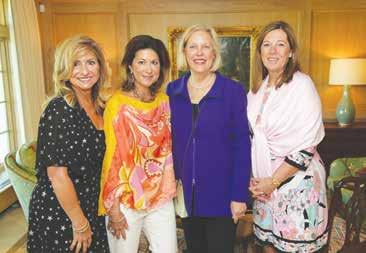


June 10, 2019 | Dearborn Country Club and TPC of Michigan

BENEFITING WOMEN’S BREAST CANCER PROGRAMS


This two-course event raised more than $355,000 to benefit women’s breast care programs and services at Beaumont hospitals in Dearborn, Taylor, Trenton and Wayne. More than 215 golfers took part at the Dearborn Country Club and TPC of Michigan. This year’s honorary co-chairs were Donald Conn, M.D. and Karen Colina Wilson Smithbauer.
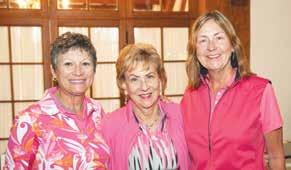




June 24, 2019 | Country Club of Detroit
BENEFITING SURGICAL SERVICES AND BREAST CARE AT BEAUMONT, GROSSE POINTE
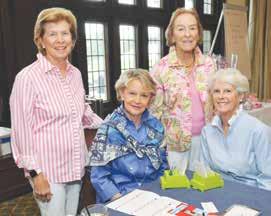

Nearly 150 golfers, 60 bridge players and 10 pickleball players came out to help raise more than $140,000 for the renovation of the cardiac catheterization lab at Beaumont Hospital, Grosse Pointe. The golf event was co-chaired by Powell Corbett and Julie Kaiser with cards co-chaired by Nancy Donnelly and Joannie Capuano.

BENEFITING CHILDREN’S MIRACLE NETWORK HOSPITALS AT BEAUMONT CHILDREN’S


Celebrating its 30th anniversary, the 2019 Beaumont Children’s Miracle Classic raised $320,000 for Beaumont Children’s. More than 250 golfers participated in this year’s event which also included a Business Partner Forecast pre-event. Funds raised will support treatment programs, advanced equipment, research and other initiatives to enrich care for Beaumont’s youngest patients. This year’s event was co-chaired by Brian Berman, M.D., Ken Noonan and Sam Yamin.















Beaumont staff, community members, and family and friends gathered to celebrate the opening of the new Max and Debra Ernst Heart Center at Beaumont Hospital, Royal Oak. The center is dedicated to consolidating cardiac care, and helps patients better manage their condition. Over the past 10 years, Max and Debra Ernst have given a total of $8 million toward Beaumont’s heart and vascular care, demonstrating an incredible commitment to helping others in the community.


September 28, 2019 | Max M. & Marjorie S. Fisher Music Center



BENEFITING BEAUMONT CHILDREN’S



Hosted by Beaumont ACO, this strolling wine and food tasting event benefited many Beaumont Children’s programs throughout Southeast Michigan. The evening also honored Beaumont Children’s Center for Human Development as the program celebrates 50 years of changing young lives and helping children in our community overcome developmental and behavioral challenges.










October 12, 2019 | Palazzo di Bocce
BENEFITING THE NEONATAL INTENSIVE CARE UNIT AT BEAUMONT HOSPITAL, TROY




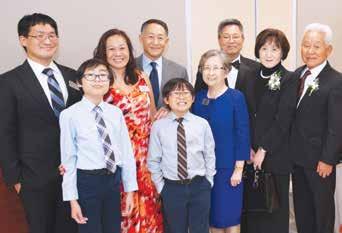




After 42 years of serving patients and communities as chief of physical medicine and rehabilitation and medical director for inpatient rehabilitation at Beaumont, Taylor, Dr. Ike Yoon has retired. Patients, colleagues, family and friends gathered to celebrate Dr. Yoon’s extraordinary career and legacy. Dr. Yoon is deeply committed to the future of physical medicine and rehabilitation, and has generously established the Ike Yoon, M.D. and Physical Medicine & Rehabilitation Education Endowment to provide staff with access to educational opportunities to advance the department.

